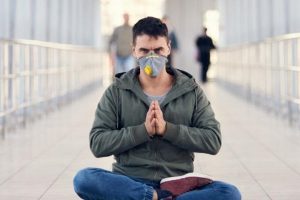Improve Alcohol Treatment Completion with Spirituality
By John M. de Castro, Ph.D.
“spiritual experiences and spiritual practices, including prayer and mindfulness meditation, may be helpful in reducing hazardous drinking and in the treatment of [Alcohol Use Disorder].” – Katie Witkiewitz
Inappropriate use of alcohol is a major societal problem. In fact, about 25% of US adults have engaged in binge drinking in the last month and 7% have what is termed an alcohol use disorder. Alcohol abuse is very dangerous and frequently fatal. Nearly 88,000 people in the US and 3.3 million globally die from alcohol-related causes annually, making it the third leading preventable cause of death in the United States. Drunk driving accounted for over 10,000 deaths; 31% of all driving fatalities. Excessive alcohol intake has been shown to contribute to over 200 diseases including alcohol dependence, liver cirrhosis, cancers, and injuries. It is estimated that over 5% of the burden of disease and injury worldwide is attributable to alcohol consumption.
An effective treatment for this addiction has been elusive. Alcoholics Anonymous has been as effective as any other treatment devised. Why is it somewhat effective when many other programs fail? Why is it effective for some, but not all? One reason could be the emphasis on spirituality present in AA. So, it is important to investigate the role of spirituality in successful treatment for alcohol abuse.
In today’s Research News article “The Effect of Baseline Patterns of Spiritual Coping, Forgiveness, and Gratitude on the Completion of an Alcohol Addiction Treatment Program.” (See summary below or view the full text of the study at: https://www.ncbi.nlm.nih.gov/pmc/articles/PMC8137607/ ) Charzyńska and colleagues recruited adults undergoing outpatient treatment for alcohol dependence and had them complete measures of spiritual coping, forgiveness, gratitude, and whether they completed the therapy program.
They report that 52.6% of the participants completed the therapy program. They found that the patients who had positive spiritual coping, forgiveness, and gratitude, and a low level of negative spiritual coping were most likely to complete the program. They also found that patients who employed negative spiritual coping had the lowest likelihood of completing the program.
Positive spiritual coping involves the search for inner peace and harmony, deep relationships with other people, seeking peace in nature, and seeking support from a higher being. The results suggest that this kind of coping makes it more likely that the patient will complete therapy for alcohol abuse. On the other hand, negative spiritual coping involves questioning life’s meaning, seeing others as hypocritical and egoistic, and questioning god’s love for humans. The results suggest that this kind of coping makes it less likely that the patient will complete therapy.
These findings suggest that people who use spirituality to make their lives better, richer, and more meaningful are more likely to be successful in alcohol abuse treatment, while those who use it as an excuse for their behavior, projecting their failures onto god and others, are less likely to be successful. Hence, spirituality is helpful for patients undergoing treatment for alcohol abuse if it used in a positive life affirming way.
So, improve alcohol treatment completion with spirituality.
“Spiritual and faith-based treatments greatly soothe the psyche and emotions and carry little to no risk of adverse impact for patients.” – Krystina Murray
CMCS – Center for Mindfulness and Contemplative Studies
This and other Contemplative Studies posts are also available on Google+ https://plus.google.com/106784388191201299496/posts and on Twitter @MindfulResearch
Study Summary
Charzyńska E. (2021). The Effect of Baseline Patterns of Spiritual Coping, Forgiveness, and Gratitude on the Completion of an Alcohol Addiction Treatment Program. Journal of religion and health, 60(3), 1796–1817. https://doi.org/10.1007/s10943-021-01188-8
Abstract
The purpose of this study was to identify distinct profiles of persons beginning alcohol addiction therapy with similar baseline configurations of spiritual coping, forgiveness, and gratitude. The associations between latent profile membership and the completion of therapy were also examined. The sample was composed of 358 alcohol-dependent persons receiving an outpatient treatment program. The Spiritual Coping Questionnaire, the Forgiveness Scale, and the Gratitude Questionnaire were used to assess the baseline levels of spirituality-related variables. Using latent profile analysis, five profiles were identified: (1) both moderately positive and negative dimensions of spirituality (33.2%), (2) moderately positive dimensions of spirituality (21.0%), (3) predominantly negative dimensions of spirituality (20.2%), (4) mixed dimensions of spirituality with the lowest positive religious coping (14.0%), and (5) highly positive dimensions of spirituality (11.6%). Notably, the latent profiles differed in terms of the treatment completion rates. The results suggest the need to carry out a multidimensional assessment of spiritual functioning of persons beginning alcohol addiction therapy to provide treatment that is adjusted to patients’ spiritual potential and deficits.
https://www.ncbi.nlm.nih.gov/pmc/articles/PMC8137607/









